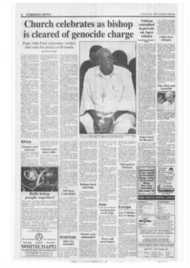Page 6, 23rd June 2000
Page 6

Report an error
Noticed an error on this page?If you've noticed an error in this article please click here to report it.
Tags
Share
Related articles
Odyssey Through Dublin
Enduring Dublin Of James Joyce
Terence Sheehy Recalls Bloomsday
Drama Is Their Heartbeat :7
Keep Out Of The Gay Bishop's Private Life
From Bloomsday to doomsday
Mary Kenny
/RECEIVED A NUMBER of greetings for "Bloomsday", on June 16, and while I always feel appreciative of any good wishes that I know are well intentioned. I look with some disfavour on this newly minted Joycean feast.
June 16, as everyone now knows, is a commemoration of James Joyce's Ulysses, being the date the author set for his picaresque tale of a Dublin day in the life of one Leopold Bloom.
The notion of Bloomsday was conceived back in the 1950s, by the writers Anthony Cronin, Myles na Gopaleen (Brian O'Nolan) and Patrick Kavanagh. Brendan Behan may have had a hand in it too. It was their wheeze to go oil to Sand mount Strand one of the set scenes in the said Ulysses and celebrate the Joycean epic, predictably with lashings of alcohol, on June 16. Some decades later, the tradition began to grow among more fashionable folks, who would give a Ulysses Breakfast, containing the repulsive menu of offal kidneys and suchlike which forms part of a breakfast described in the text. More recently Bloomsday took on the mantle of "heritage", which generally means that something has turned into a historical theme park and a codified part of the tourist industry. Each Bloomsday now, people dress up in Edwardian boaters and enact scenes from Ulysses, and there are paving stones on Dublin sidewalks to illuminate, for visitors, the significant points of the Ulysses peregrinations.
It is all harmless enough, suppose: and one of the genuinely interesting aspects of Ulysses itself is that it is, apparently, topographically flawless. You could recreate a model of Dublin on a desert island just from reading Ulysses. Joyce took immense care to check his architectural and topographical facts. Perhaps he planned it as a tourist guide in the rust place he was not above such calculation. (He put "difficult" passages into his text deliberately to give researchers from the University of Texas something to mull over.) Yet the last living literary legend from the first Bloomsday celebrations, Anthony Cronin (read his re-issued book Dead as Doornails for a piercing and hilarious account of Dublin literary life in the 1940s and 50s) has denounced the present cult of Bloomsday for distorting the picture. The characters in Ulysses, he points out, were failures. They were shabby, down-at-heel, desperate to keep up appearances somehow, but usually living from hand to mouth. This is what made them poignant. It is ludicrous for merchant bankers and millionaire architects to go around marking Bloomsday in their smart belle epoque outfits, meeting in opulent restaurants serving Leopold Bloom breakfasts. It is a mockery of what the odyssey is all about.
I also believe that celebrations such as Bloomsday are deliberately concocted to replace the religious feasts that were traditionally celebrated in these early months of summer. Bloomsday is gradually replacing such wonderful traditional feasts as Corpus Christi, where once the slums of Dublin were scattered with rose petals. And Bloomsday is not alone. It is no coincidence that Father's Day now falls on Trinity Sunday, which celebrated the Father, Son and Holy Spirit of the Christian Trinity. It is no coincidence that Mother's Day, fixed into the spring calendar, was devised to replace such significant feasts as the Feast of the Annunciation, the most frequently painted subject in the history of European painting. St Patrick's Day is being altered from a holy day celebrating the evangelisation of Ireland into a multi-ethnic Mardi Gras, with pagan symbols of dragons and witches, just as Mardi Gras itself, the pre-Lenten festivity of Shrove Tuesday, has itself been colonialised by Gay Pride.
The Christian feasts of Ascension and Pentecost have long since been swallowed up by the mercantile notion of the Bank Holiday. Thankfully, the continentals still mark these feasts just as they were: in France, Whitsun is nationally marked as Pentecote and Ascension Thursday itself remains the holiday of the Ascension.
Yes, it is true that Christian feast days themselves often replaced feasts on the old pagan calendars. But that was because Christianity was becoming the prevailing culture. I do not welcome the notion that Bloomsday signifies that Christianity itself has been surpassed. But that is the idea behind such celebrations.
THERE IS ONE, over
whelming cause which explains the bad behaviour of English soccer hooligans abroad: the exceptionally high rate of divorce in England and Wales. This has been thoroughly documented by Norman Dennis and George Erdos in their study Families Without Fatherhood published by the Institute of Economic Affairs. Young men growing up without the care, guidance and protection of a good father, in their everyday lives not as a visiting presence every second Saturday grow up unsocialised. They grow out of control, are yobbish, thuggish and quite literally uncivilised. They turn into football hooligans. Yet Government after Government in Britain has successively facilitated more and easier divorce, and the present Home Secretary, Jack Straw, said earlier this year that marriage didn't really matter very much. The Blair administration is solidly opposed to "favouring" marriage over any other form of social arrangement. If the hooligans' conduct backfires against the politicians, they deserve it.
blog comments powered by Disqus













